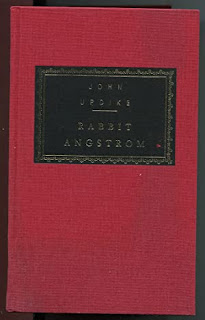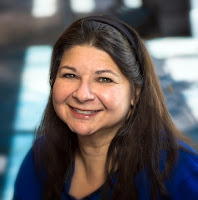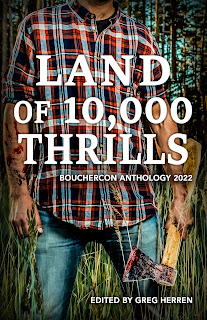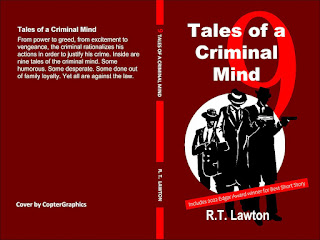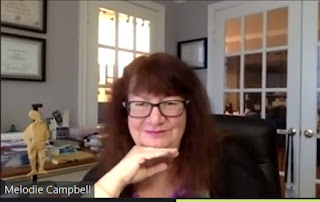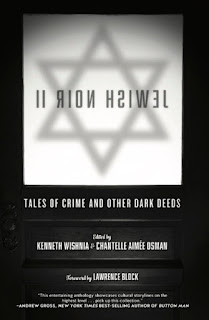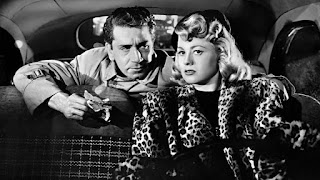Flat characters are two-dimensional in that they are relatively uncomplicated and do not change throughout the course of a work. By contrast, round characters are complex and undergo development, sometimes sufficiently to surprise the reader.
Stock character, a character in a drama or fiction that represents a type and that is recognizable as belonging to a certain genre. Most of the characters in the commedia dell'arte, such as Columbine and Harlequin, are stock characters.
– Both quotations courtesy of The Encyclopedia Britannica
I have written at length in this space about the importance of character development in your writing. (If you're interested in reading some of my previous work on character, feel free to click here, here, here, and here.) And lately, I've returned to the well, and begun to consider the importance of the delicate balance of character development versus character continuity.
Take John Updike's Rabbit series of four novels, all featuring the same central character, Harry "Rabbit" Angstrom. The series takes place over a span of thirty years, taking Rabbit from his mid-twenties to his death in retirement. Updike released the various novels an average of ten years apart (1960, 1971, 1981 and 1990). The final two novels (Rabbit is Rich and Rabbit at Rest) won the Pulitzer Prize for fiction.
Over the course of the series Updike kept his character restless and angsty, while also showing both physical and mental changes in the character as he grew older. He did this against an evolving social backdrop (the early '60s, '70s, '80s and '90s, respectively) that dovetailed pretty seamlessly with the character's arc (see my post on the effective use of setting as another character in your work). And, obviously, "Rabbit" Angstrom would be an example of the "round character" defined above. Taken as a whole, the books are well worth your time.Where Updike's series presents a collective masterwork of balancing development and continuity, it has in many ways presented an outlier bucking the last few decades of writing marketplace trends. This seems especially true in crime fiction.
Don't get me wrong. There are lots of great writers currently out there developing their characters, working their collective tails off, and producing really unforgettable stuff.
However.
The last few decades have seen the rise of the so-called "airport thriller." And where early practitioners of the art of thriller writing (then, as now, a sub-genre of crime fiction), such as Robert Ludlum and the immortal Elmore Leonard were masters equal to Updike in writing characters who showed growth, they have proven the exception rather than the rule. The emphasis in thrillers is on fast-paced plotting, and with the market growing more and more lucrative, publishers have shown a preference for thrillers as part of a series of books, rather than the stand-alones most favored by so many masters of the sub-genre.
I'm not giving examples because I'm not looking to call anyone out. Plus, were my agent to tell me tomorrow that a top five publisher was offering me a multi-book contract adorned with a whole lot of zeroes to write thrillers that adhered to these standards, I would not hesitate to dive into this end of the writing pool. Character development tends not to be a hallmark of thriller writing. It's delightful to see when you find it, but truth be told, thriller fans (my brother among them) tend to read thrillers for the action, first and foremost.
What I'm saying is that I have begun to see this "light" character development crop up more and more in other types of crime fiction, especially in any number of series. The character has a benchmark, and even in a series that runs for years, tends to vary little from said benchmark. In so doing, series lead characters which ought to be "round" tend to take on the aspects of so-called "stock characters."
Rather than give examples of this, let me go in the opposite direction, using a real world example.
There's this guy I used to know. We grew up on the same block. Neighbors and friends for years and years. We eventually lost touch (as people often do), and a few years ago, I happened across his social media presence. Here's a thumbnail of the "character" I found there:
My old friend worked in radio, eventually helming his own talk radio show. From here he took a quick detour into StartUpLand at one of the pioneer startups where he made a pile, then eventually found his way back into talk radio. Now in his fifties, his political and social positions seem to rely heavily on the foundation of his deep spiritual faith, and the importance of his family in his life.
And I say good for him. He was a great guy back then, and I have little doubt he still is.
What makes this thumbnail so interesting is the set of fundamental differences I see between the guy I knew back in early-to-mid '80s and his current self. When we were teenagers growing up together, my old friend was practically a socialist. And for all intents and purposes heavily agnostic (not irreligious so much as indifferent to religion). Something that hasn't changed at all is that he was a brilliant, and opinionated conversationalist then, as he still seems to be. One huge difference was that he loathed Ronald Reagan more than I did (I still do. If anything I loathe Reagan more in retrospect). Not sure what's changed there, but needless to say, my friend isn't exactly "anti-Reagan" (or anti-his memory, I guess) these days.
Some other things: he went on a family vacation with myself and my extended family, and developed his first real crush on a girl who came on the trip with one of my cousins. It was amusing to watch this most opinionated of guys basically abandon several of his previous opinions based on what his new love interest thought.
And yet I never saw him in love again during the time I knew him. If anything I saw him protecting his heart, flirting with girls, never dating, plenty of "hanging out," but never making himself "available."
Here's the funniest part, though. I had another friend back in my teens. Conservative, grew up with a strong church background, also opinionated. Loved Reagan.
I've stayed in touch with this friend. He's got grown kids, a thriving career in a union construction job, climbs mountains and he frequently uses his free time helping build schools in Sub-Saharan Africa. I have no idea how feels about politics these days. We don't talk politics when we talk. We talk music. And it's always great.
That funny thing? My first friend back in the day heartily disliked this second friend. And nowadays my second friend reminds me of my first friend in his youth and that first friend reminds me much more of my second friend in his youth.
Heyyyyy I think I might have the germ of a story idea here....
See you in two weeks!

